Each of the three films that made up George A Romero’s conceptually linked ‘Dead’ series were quite enigmatic, and now stand as some of the most influential memes in modern cinematic history. This feature for Deathmetal.Org need not explicitly make side references between the musical subculture of which we write to this realm of celluloid, as its popularity with many of death metal’s listening base is well known to those who have insight.
The Night of the Living Dead
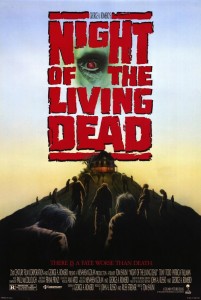
Mankind eschews the macabre and the horrifying and in so doing never fully realizes, learns of or utilizes his whole nature. With the exception of a few brave souls, many people prefer to lead idle unchallenged and unexamined lives, if only because the contrary adventure is difficult and exposes one to multifarious existential realizations, including the reality of the ephemeral nature of ones existence. This I conclude is one reason why the horror genre is generally held in such contempt by modern man, when utilized effectively, not only does it confront the eschewed amoral primordial concerns of mans essential being, it does so in a way that is urgent and demanding of ones attention. Having set up his ever safe concrete abode, modern man now hibernates, avoiding existence and its deeper philosophical puzzle’s in favour of sugar coated half-truths such that soothe and reassure him of his “equality” his “individual uniqueness” and his “inherently universal importance”.
The legendary, provocative and incendiary “Night of the Living Dead” does the exact opposite as it confronts, plays on, and plays with the innate primal fears, dynamics and concerns of mankind. Although loosely conceived as an apocalyptic encounter with the forces of the “living” dead, a profound level of psychological insight and evocative symbolism permeates George A Romero’s “Night of the Living Dead” and thus qualifies this work as a true modern masterpiece and a generally overlooked piece of art.
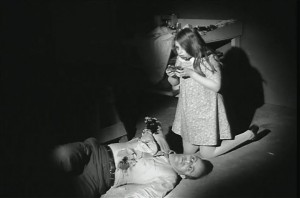
With no little genius Romero effectively lulls viewers into a world viewers can easily relate to by evoking and mirroring significant aspects of our everyday life. Each detail, from the realistically portrayed incompetence of societal authority figures, the naive adherence of people to the demands of the television, the undeniable emotional bond between brother and sister, to the familiar sounds of everyday life, including the incessant chirping of crickets, allows the viewer to fundamentally relate to and plunge into Romero’s world. In fact, the capacity to create a world or setting that so closely mirrors not only a Cold War world obsessed with science and technology but also a timeless, comfortable and familiar, although eerily de-contextualized reality represents perhaps the most important aspect of Romero’s film. These considerations in conjunction with Romero’s capitalization on further cinematic realism, forces the viewer to take seriously the events unfolding within it. Rather than questioning the veracity or possibility of the events unfolding viewers are drawn into reacting, along with whichever psychological archetype they most closely identity with, to the horrifying and challenging events that are taking place.
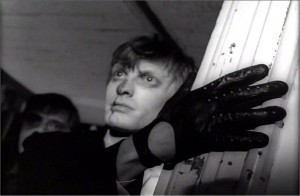
Although shot in black and white, Romero’s masterpiece lends itself to such profound levels of interpretation that a mere moral and linear evaluation of the film, the characters, or the actions and events therein becomes impossible. To suppose that the contrast between the black and white film and the various gradations of interpretation the film lends itself to was an intentional decision does not appear as dubious as one may suppose. In fact, it seems to coherently present an ingenious tongue in cheek and subtle level of social commentary on a society that was, and still is, increasingly seeing the world in simple morally absolutist ways amidst an inherently complex reality that disdains simple moralistic evaluations.
Through an ingenious development of the story, viewers, while perhaps horrified at the attacking zombies, are not given the pre-requisite moral education or signifying variables that would make it intellectual honest to morally condemn these purely instinctual flesh eating parasites, whose origin can be laid at the feet of man alone. This of course increases the profundity of the film as Romero brilliantly turns the story away from the simple and exhausted “us versus them” or “good versus evil” theme. Viewers are thus forced, beyond the categories of good and evil, to search for, construct and perhaps impose upon the film a more profound meaning.
Romero’s ability to vividly explore, amidst an environment whose intensity is heightened due to the proximity of death, the nature of human relationships, tribal power dynamics, and the capacity for the characters to deal with the prospect of their immanent demise reveals an attempt on part of the film to explore and highlight some of the fundamental aspects of mans primal nature. The intriguing and dynamic character relationships, for example, reveal and augment the inherent antagonism between virtue and vice and we witness concretely the poignant disparity between courage and cowardice, shortsightedness and wisdom, emotion and reason, optimism and pessimism. Viewers also witness the psychological development of each character as they are confronted with possibility of death, themselves symbolizing at a more significant level various timeless psychological archetypes with which it is difficult for the viewer to not identify with.

Additionally, the revelatory and intrinsically personal antagonisms that define each character bear witness to a decisively human element within the film, such that it becomes difficult for the viewer to not empathise with the manifold and sometimes dubious decisions and reactions of each character. This thankfully increases the level of interpretative depth and challenges the viewer; cowardice contextualized instead becomes the instinctual protection of the father, co-operation and perhaps courage resemble stupidity, pessimism becomes realism, optimism becomes fantasy, and so on. In contrast to many latter day films which celebrate an easy and crowd friendly reality that is typically one dimensional, “Night of the Living Dead” successfully transcends this pitfall and successfully mirrors the complexity of the human condition and the multiple variables that determine its structure.
Moreover, “Night of the Living Dead” includes the uncanny capacity to raise an array of questions that unsettle and challenge the mind: Who exactly is Romero referring to as the “Living Dead”? In what ways does technology bring about mans apocalyptic future, has our technological hubris undone us? How does the theme of technology relate to the zombies aversion to fire? How do we relate to and mirror the zombies at an instinctual level? Indeed, a plethora of questions, paradoxes and insights awaits the discerning viewer.
However, in the end what is horrifying about “Night of the Living Dead” is not the flesh eating zombies, it is the capacity for this film accurately reflects man’s condition on so many levels, and to expose the viewer to his or her own primal nature. Above all, what meaning one extracts will depend on each individual’s capacity to plume the philosophical depths implied by one of the main conceptual tenants that drives this movie forward: Only Death is Real.
-TheWaters
Dawn of the Dead
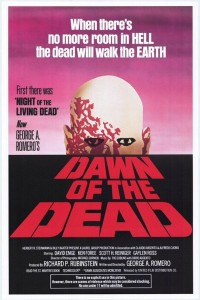
Combustive, feverishly paced and exploitative almost in an infantile way are some of the qualities of the first follow-up to Romero’s original terror classic. By 1978 merciless killing, cannibalism, pile-up of corpses and explosions of gore had journeyed through the forbidden territories of ‘grindhouse’ B-movie theaters all the way to the brink of mainstream as it seemed already the norm to distrust the ‘establishment’. This is satirically extrapolated by the first few minutes where a cop operation gone awry climaxes with a spectacular scene of shooting a person’s head completely off as if it was no big deal.
The colorful but dimensional 35 mm cinematography, financed with the help of Dario Argento’s Italian team, lets Romero to indulge in more ‘hi-tech’ action than before with plenty of fast tracked views from helicopters but also conduct long and gritty depictions of places and people (and of course the zombies) as if we were watching a documentary. He did not originate this technique, but especially in ‘Dawn of the Dead’ mastered it so far that if there is one movie that seems to truly reveal the morbid but ordinary facets of disillusioned 70′s life in the United States, it must be this. The fantasy elements do not seem to be such when immersed in the logical and natural unfolding of the events.

‘Dawn’ is the first of the movies where a point is made of the zombies being less than authentic enemy but rather pathetic victims of a disastrous failure of civilization. The hard boiled soldiers’ execution of zombie families with children is chilling, echoing the amoral vigilante mentality that pervaded a myriad of cult classics of the era. When the supermarket setting allows the script to use both the human characters and the masses of the dead as two ‘classes’ of consumerism, the dimensions of the movie become delightful and tormenting – especially as it is conducted with the flair of a movie magician without an ounce of excess political rant.
Ultimately the angle is cynical since the characters seem very happy with their boring and cyclical existence in the safety of the supermarket, shielded from the dangers of the outside world and appropriately only at the moments of danger does an enlivening sparkle permeate their mind and hands. The intrapersonal dynamics are still reminiscent of ‘The Thing from Another World’ (1951), a veritable science fiction classic where the alien ‘thing’ was deemed almost irrelevant because of the all-around devastation wreaked by social and personal problems of respected figures such as scientists and soldiers.
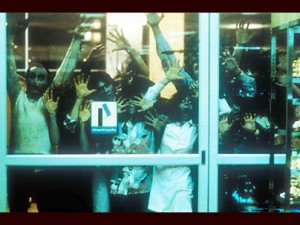
Despite the passed decades of pushing all-around borders, the gore in the movie still repulses in its humorous viciousness. Besides the more didactic ‘Salò’ and the more amateurish ‘Texas Chainsaw Massacre’, it’s one of the earliest full-fledged exercises in movie brutality, of the bombardment of visual ugliness. It is entirely in parallel with syncopated, jagged, atonal and growled music as medium; it forces the mind to make certain choices while most mainstream entertainment attempts to unify people with hypnotized neutrality and smooth edges.
It’s hard to pick a favorite from the trilogy but there are nuances and an all-out spirit of warfare in this one quite unmatched by the others, which do raise different points of abstraction by themselves. The battle of solitary but teamed individuals against the masses of horrible biological abomination strikes a note which can seem scarily familiar. The message is cryptic but it is spoken loud – there is no more room in Hell…
–Devamitra
Day of the Dead
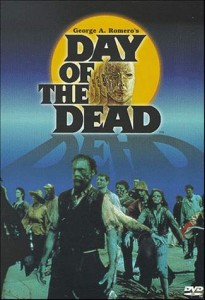
Undoubtedly the most cynical and dark of Romero’s ‘Dead’ trilogy, ‘Day Of The Dead’ continues the concepts explored in ‘Night Of The Living Dead’ and ‘Dawn Of The Dead’ which to the social anthropologist fall perfectly within the societal contexts of their decade, both in terms of appearance and issues dealt with. 1985′s ‘Day Of The Dead’, the intended third of George A Romero’s trilogy for the most part tackles Cold War paranoia dead on, and conveys a sense of isolation, disorder, and internal conflict that 1978′s ‘Dawn Of The Dead’ hinted at.
Whereas ‘Night Of the Living Dead’ contaminated the countryside, and ‘Dawn Of The Dead’ contaminated greater consumerist society, the third of these films now brings the viewer to a conclusion in where all previous facets of Western human society have been fully violated, with the few to emerge unscathed hibernating in underground shelters where in spite of a common need to survive, greater in-fighting occurs. This film is a much more dramatic affair than any of the previous two, and as a result its subject matter becomes more obtuse. Science and anatomy play a greater role in this film, in which the chief lab technician attempts to find means as of how to reanimate the once living, or do bring about a reversibility to the impulse-only movement of the undead. The soundtrack is mostly synthesized, having an emotive depth not unlike a cross between the scores to Scott’s ‘Blade Runner’ and Argento’s ‘Tenebrae’.
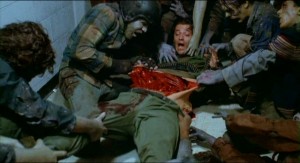
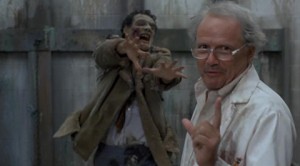
The graphical element of the third of these films is more prominent, the gore more repulsive, the atmosphere more repulsive and suspensive. Some would suggest that the quite lengthy build up of this installment is detrimental to the overall quality of the film, but in the opinion of the reviewer gives an excellence not seen in the previous two installments, the most intelligent and and serious of Romero’s zombie films.
–Pearson
No CommentsTags: zine-video
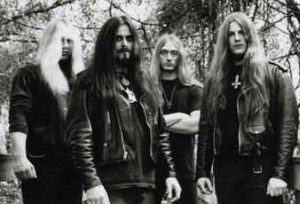 It is often asserted that some of the best works of the death metal genre arose as if by accident. A better assertion is that by the early 1990′s, many artists prominent within this musical form found themselves at a level of impassable momentum; a culmination of instrumental violence, a taste for profound and subversive ideals and a sadistic will to power. The year 1992 found death metal at its most potent, chaotic, destructive and virile, just as speed metal was in ’86, and black metal in ’93. Legion sets itself in a league of its own, giving each musician a distinct elemental voice. Glen Benton’s cthonian barking is at its most virulent and savage, guttural yet dynamic, having a rhythmic cohesion that is comparable to that of David Vincent, but separable in tonality. His bass playing is clearly audible, sandwiched in between the juxtaposition of the trebly guitars, which are thankfully never distant or uninterpretable. The drumming of Steve Asheim is insanely over the top yet disciplined, as if one were battering cakes laced with grenades. The musical influence of Slayer is the clear template for Deicide’s work, and in terms of compact intensity, Legion is to their self titled debut what Reign In Blood was to Hell Awaits. A parallel can also be drawn to Slayer in the musical interplay in the dissonant soloing techniques that see the best ideas of Hanneman and King taken towards a polyphonic atonality. The album radiates just under half an hour of pure blasphemous momentum, and communicates through spiraling, chopping guitar riffs that sit in perfectly with a multi-faceted rhythm section. Structurally Legion emphasizes a highly proficient musical backdrop, which advances what was exhibited on their debut and compresses it into a greater density that is both a pleasure to listen to and gives Deicide a platform on which to construct their most unique and standout work. Virtuosity echoes the best work of Atheist and Voivod if the melodic and progressive rock tendencies were eschewed, whilst the pattern language and aesthetic is in league with the best work of Morbid Angel, Sepultura, Massacra and Suffocation. This is Deicide’s pinnacle, one they would never surpass. A fundamental cornerstone of death metal, one of the all time best.
It is often asserted that some of the best works of the death metal genre arose as if by accident. A better assertion is that by the early 1990′s, many artists prominent within this musical form found themselves at a level of impassable momentum; a culmination of instrumental violence, a taste for profound and subversive ideals and a sadistic will to power. The year 1992 found death metal at its most potent, chaotic, destructive and virile, just as speed metal was in ’86, and black metal in ’93. Legion sets itself in a league of its own, giving each musician a distinct elemental voice. Glen Benton’s cthonian barking is at its most virulent and savage, guttural yet dynamic, having a rhythmic cohesion that is comparable to that of David Vincent, but separable in tonality. His bass playing is clearly audible, sandwiched in between the juxtaposition of the trebly guitars, which are thankfully never distant or uninterpretable. The drumming of Steve Asheim is insanely over the top yet disciplined, as if one were battering cakes laced with grenades. The musical influence of Slayer is the clear template for Deicide’s work, and in terms of compact intensity, Legion is to their self titled debut what Reign In Blood was to Hell Awaits. A parallel can also be drawn to Slayer in the musical interplay in the dissonant soloing techniques that see the best ideas of Hanneman and King taken towards a polyphonic atonality. The album radiates just under half an hour of pure blasphemous momentum, and communicates through spiraling, chopping guitar riffs that sit in perfectly with a multi-faceted rhythm section. Structurally Legion emphasizes a highly proficient musical backdrop, which advances what was exhibited on their debut and compresses it into a greater density that is both a pleasure to listen to and gives Deicide a platform on which to construct their most unique and standout work. Virtuosity echoes the best work of Atheist and Voivod if the melodic and progressive rock tendencies were eschewed, whilst the pattern language and aesthetic is in league with the best work of Morbid Angel, Sepultura, Massacra and Suffocation. This is Deicide’s pinnacle, one they would never surpass. A fundamental cornerstone of death metal, one of the all time best.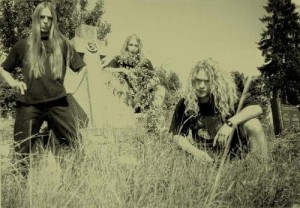 Wolves howl and demons prowl on all sides of the mythical mountains of the Slavic kingdom, and each one of you well knows the quests of glory from Poland, Austria and Ukraine; yet, Slovakia in between, shadowed in behest of the more expulsive, westernizing Czech Republic, remains without any internationally celebrated “status whore”. As usual, this is not because of a lack of intrinsic quality or statements regarding vital manners and occult pathways; reasons are dealing with the superficial and corrupt nature of mankind. Until about 1989, the communist government hated the rock influenced expression as a tool of capitalist destruction, but worst of all free thinking and youthful rebellion, the enemy of all governments everywhere.
Wolves howl and demons prowl on all sides of the mythical mountains of the Slavic kingdom, and each one of you well knows the quests of glory from Poland, Austria and Ukraine; yet, Slovakia in between, shadowed in behest of the more expulsive, westernizing Czech Republic, remains without any internationally celebrated “status whore”. As usual, this is not because of a lack of intrinsic quality or statements regarding vital manners and occult pathways; reasons are dealing with the superficial and corrupt nature of mankind. Until about 1989, the communist government hated the rock influenced expression as a tool of capitalist destruction, but worst of all free thinking and youthful rebellion, the enemy of all governments everywhere.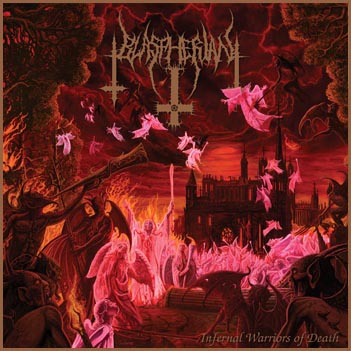
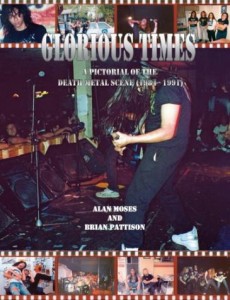 Some readers may have noticed the recent addition of a side bar promoting “
Some readers may have noticed the recent addition of a side bar promoting “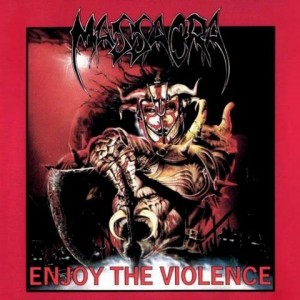
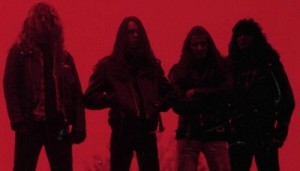 … So spake the lyrically impassioned and thoroughly blood-splattered master torturer from Octave Mirbeau’s exploitative allegory ‘Le Jardin des Supplices‘ — a work often regarded as the French parallel to Joseph Conrad’s ‘Heart of Darkness’ in its mutual objective towards smashing the moral edifices of Western civilization and exposing the corrupted, putrefying soul beneath. Framed in this excerpt is a rational, eloquent and yet sickeningly grotesque declaration of sadism as a fine art — or even a manifestation of divine love — which so happens to mesh very excellently with the more measured methods that
… So spake the lyrically impassioned and thoroughly blood-splattered master torturer from Octave Mirbeau’s exploitative allegory ‘Le Jardin des Supplices‘ — a work often regarded as the French parallel to Joseph Conrad’s ‘Heart of Darkness’ in its mutual objective towards smashing the moral edifices of Western civilization and exposing the corrupted, putrefying soul beneath. Framed in this excerpt is a rational, eloquent and yet sickeningly grotesque declaration of sadism as a fine art — or even a manifestation of divine love — which so happens to mesh very excellently with the more measured methods that 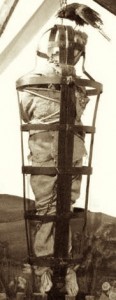 Markedly fewer motifs are employed — a few even resurface on multiple songs — and yet it is this very spareness that imparts such character and memorability unto each composition, along with a newfound, almost cinematic command over tempo, texture, voicing and atmosphere. In addition to the familiar
Markedly fewer motifs are employed — a few even resurface on multiple songs — and yet it is this very spareness that imparts such character and memorability unto each composition, along with a newfound, almost cinematic command over tempo, texture, voicing and atmosphere. In addition to the familiar 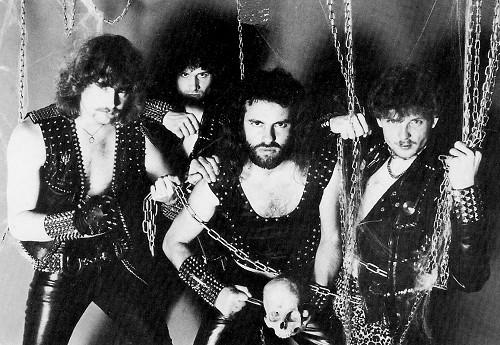 1.
1.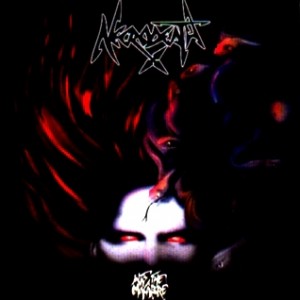
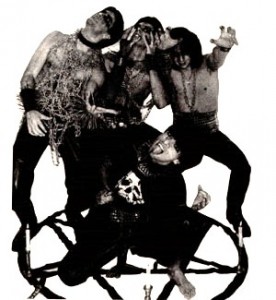 The sensual Italian attack in Into the Macabre, enveloped by the scents of leather, sweat and blood, is by no accident a bastard brother of the proto-war metal invocations of Morbid Visions and INRI, while the technical details show that the necro-warriors spent years studying the works of Slayer and Destruction. Most of all, Into the Macabre is an opera of rhythm, of intense vocal timings, stampeding blastbeats and onrushing chromatic and speed metal riffs which warp under the extremely analog old tape production into ambient paysages of ghostly frequency, much like the evil and infectious “Equimanthorn” of classic Bathory. Songs like “Necrosadist” seem to have the structure of a grotesque sexual orgy where each consecutive part tops the previous in volume and hysteria, with short breathing spaces in between to capture and organize the listener’s attention. Like the aforementioned Brazilian albums, Into the Macabre is one of the cases where music is about as far from an intellectual exercise as one gets, into the catacombs of a devil/alcohol/glue-possessed teenager’s brain but for the discerning and maniacal old school death metal listener there is no end to the amount of pleasures, revelations and evil moments that make it seem some transcendental guidance indeed dwells at the shrine of the unholy mystic.
The sensual Italian attack in Into the Macabre, enveloped by the scents of leather, sweat and blood, is by no accident a bastard brother of the proto-war metal invocations of Morbid Visions and INRI, while the technical details show that the necro-warriors spent years studying the works of Slayer and Destruction. Most of all, Into the Macabre is an opera of rhythm, of intense vocal timings, stampeding blastbeats and onrushing chromatic and speed metal riffs which warp under the extremely analog old tape production into ambient paysages of ghostly frequency, much like the evil and infectious “Equimanthorn” of classic Bathory. Songs like “Necrosadist” seem to have the structure of a grotesque sexual orgy where each consecutive part tops the previous in volume and hysteria, with short breathing spaces in between to capture and organize the listener’s attention. Like the aforementioned Brazilian albums, Into the Macabre is one of the cases where music is about as far from an intellectual exercise as one gets, into the catacombs of a devil/alcohol/glue-possessed teenager’s brain but for the discerning and maniacal old school death metal listener there is no end to the amount of pleasures, revelations and evil moments that make it seem some transcendental guidance indeed dwells at the shrine of the unholy mystic.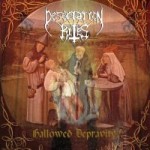 As if poisonous arachnoids had woven a sticky web around a hermit of the desolate Pampas, the multitude of savage Angelcorpsean riffs blasts from Desecration Rites’ rehearsal room with hardly any control or structure for the confounded listener to immerse in. The Argentinian blackened death duo did not have the time to execute all matters properly here because of unfortunate circumstances, and it shows in the deprecated, spastic rhythm of machine, the hysterical frequency and bouts of unclean guitar work all over the place. If something is keeping these dogs of sequences under leash, it is the deep, rumbling voice of Wolf intoning Faustian misery from the bottomless depths of darkness, occasionally unwinding power lines of similar effect to Craig Pillard’s majestic demon voice in the eternally classic Onward to Golgotha. For the modern death metal fan expecting a digitized, synthetic robot surgery there is probably no more horrific sight than this deluge of an album, but internally it is far more hypnotic, intricate and deadly than one could hope for. Just listen to the freezing pseudo-Nordic moments of “Death Sentence to an Agonizing World” or the ethereal, solar and jarring interlude of “Carnal Dictum” and you might just get a slight moment of hope in the future generations after all.
As if poisonous arachnoids had woven a sticky web around a hermit of the desolate Pampas, the multitude of savage Angelcorpsean riffs blasts from Desecration Rites’ rehearsal room with hardly any control or structure for the confounded listener to immerse in. The Argentinian blackened death duo did not have the time to execute all matters properly here because of unfortunate circumstances, and it shows in the deprecated, spastic rhythm of machine, the hysterical frequency and bouts of unclean guitar work all over the place. If something is keeping these dogs of sequences under leash, it is the deep, rumbling voice of Wolf intoning Faustian misery from the bottomless depths of darkness, occasionally unwinding power lines of similar effect to Craig Pillard’s majestic demon voice in the eternally classic Onward to Golgotha. For the modern death metal fan expecting a digitized, synthetic robot surgery there is probably no more horrific sight than this deluge of an album, but internally it is far more hypnotic, intricate and deadly than one could hope for. Just listen to the freezing pseudo-Nordic moments of “Death Sentence to an Agonizing World” or the ethereal, solar and jarring interlude of “Carnal Dictum” and you might just get a slight moment of hope in the future generations after all.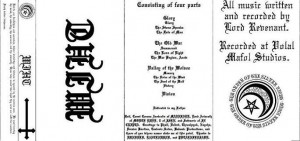 This British debutant lets loose the heathen wolves of war with a triumphant fanfare akin to Vlad Tepes’ famous Wladimir’s March before leading us to a journey of mountainous black metal landscapes, Graveland-esque meditations, ancient English fire-lit caves and Zoroastrian philosophy. The same sort of extended pagan tremolo epics (18 minutes of length at worst) that made countrymen Forefather and Wodensthrone veritable trials to sit through are pretty close at hand here, but the sparkling energy of youth helps a lot; there is a wildness and intrigue that contributes variation in sense even when there is none in content. Much of the logic of the songs seems to be emotionally stringing disparate sequences into a journey or a fictional narrative, which is essentially never a bad choice but some of the material here could be cut off to be brutally honest. Sound quality is the pseudo-spatial vacuum of too much reverb common for demo-level bands, but the instruments are clearly audible and the mid-rangeness is efficaceous. Unmoving and halfhearted chants and throwaway happy riffs are the blight of heathen metal, but Lord Revenant possesses sufficient pathos to allude to traces of occult evil and memories of ancient war at the same time; while this effort is not enough to coin him as a master of British metal, it would be a disappointment to hear these same songs performed by a more professional, disinterested voice in the future, or see him disappear without a trace after such a promising start.
This British debutant lets loose the heathen wolves of war with a triumphant fanfare akin to Vlad Tepes’ famous Wladimir’s March before leading us to a journey of mountainous black metal landscapes, Graveland-esque meditations, ancient English fire-lit caves and Zoroastrian philosophy. The same sort of extended pagan tremolo epics (18 minutes of length at worst) that made countrymen Forefather and Wodensthrone veritable trials to sit through are pretty close at hand here, but the sparkling energy of youth helps a lot; there is a wildness and intrigue that contributes variation in sense even when there is none in content. Much of the logic of the songs seems to be emotionally stringing disparate sequences into a journey or a fictional narrative, which is essentially never a bad choice but some of the material here could be cut off to be brutally honest. Sound quality is the pseudo-spatial vacuum of too much reverb common for demo-level bands, but the instruments are clearly audible and the mid-rangeness is efficaceous. Unmoving and halfhearted chants and throwaway happy riffs are the blight of heathen metal, but Lord Revenant possesses sufficient pathos to allude to traces of occult evil and memories of ancient war at the same time; while this effort is not enough to coin him as a master of British metal, it would be a disappointment to hear these same songs performed by a more professional, disinterested voice in the future, or see him disappear without a trace after such a promising start.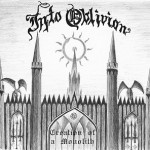 More than one and a half hours of harsh, pummelling death metal is neither a mean feat to compose nor to listen. As if Wagner, Brahms or even Stravinskij decided in the otherworld that these wimpy rock/metal kids have had it too easy and possessed various souls to spend hundreds of nights writing progressive Romantic/Faustian death metal partitures, 20+ minute pieces such as the title track or “On the Throne’s Heavenward” lumber and crush with such interminable weight that it is hard to not feel like attacked by a divine hammer from above as designed by Gustave Doré. You can forget about them mosh parts, since this is material about as brainy as anything by Atheist, with slow-moving adagios and creeping crescendos more familiar from Brian Eno’s ambient music or Esoteric’s hypno-doom than anything in satanic metal realm. Vocals are sparse and it feels like about a half of the album is purely instrumental and this creates a strange calm suspension which might even feel uncomfortable; but compared to The Chasm’s mastery of technique, it still does feel like an essential emotional counterpoint or rhythmic pulse bestowing element is missing, and when the cruel vocals suddenly rip the air, it might even be perceived as a disturbance to the solemn atmosphere. Nevertheless, it is probable that they are going for exactly this synthesis of the intellectual and the primal; the emotional and the physical. So fortress-like, rational, calm and measured that it is hard to connect its spirituality with its death metal origins (even the previous Into Oblivion release), it is certainly an important statement while the cumbersome nature and certain academicism in construction (perhaps “filler” in metal language, the problem of the previous album as well) makes it a bit of an unlikely candidate for casual listening. Anyone interested in the future of Death Metal cannot afford to miss it, though.
More than one and a half hours of harsh, pummelling death metal is neither a mean feat to compose nor to listen. As if Wagner, Brahms or even Stravinskij decided in the otherworld that these wimpy rock/metal kids have had it too easy and possessed various souls to spend hundreds of nights writing progressive Romantic/Faustian death metal partitures, 20+ minute pieces such as the title track or “On the Throne’s Heavenward” lumber and crush with such interminable weight that it is hard to not feel like attacked by a divine hammer from above as designed by Gustave Doré. You can forget about them mosh parts, since this is material about as brainy as anything by Atheist, with slow-moving adagios and creeping crescendos more familiar from Brian Eno’s ambient music or Esoteric’s hypno-doom than anything in satanic metal realm. Vocals are sparse and it feels like about a half of the album is purely instrumental and this creates a strange calm suspension which might even feel uncomfortable; but compared to The Chasm’s mastery of technique, it still does feel like an essential emotional counterpoint or rhythmic pulse bestowing element is missing, and when the cruel vocals suddenly rip the air, it might even be perceived as a disturbance to the solemn atmosphere. Nevertheless, it is probable that they are going for exactly this synthesis of the intellectual and the primal; the emotional and the physical. So fortress-like, rational, calm and measured that it is hard to connect its spirituality with its death metal origins (even the previous Into Oblivion release), it is certainly an important statement while the cumbersome nature and certain academicism in construction (perhaps “filler” in metal language, the problem of the previous album as well) makes it a bit of an unlikely candidate for casual listening. Anyone interested in the future of Death Metal cannot afford to miss it, though.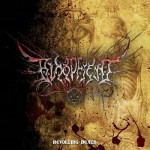 Heirs to the bludgeoning power of Escabios and other ancient compatriots, this recent Argentinian sect wastes no time with progressive anthems, intros nor filler in this concise EP of Autopsy influenced memoirs of early 90’s scathing death metal savagery. If the band has capacity for a challenging composition or a range of emotion, it’s all but hidden in this conflict of vulgar and intense demo taped riffs that could originate on any scummy cassette dug up from your older brother’s cardboard box vaults. Even most crustcore bands could hardly resist the temptation to fill the gaps out with something more liberal, but I am glad Bloodfiend do not resort to any loose pauses in their old school attack. The band is not yet quite there in the top ranks of death metal resurgence, but possess more than their share of contagious energy that will make for a good live experience and raise hopes for a more dynamic album.
Heirs to the bludgeoning power of Escabios and other ancient compatriots, this recent Argentinian sect wastes no time with progressive anthems, intros nor filler in this concise EP of Autopsy influenced memoirs of early 90’s scathing death metal savagery. If the band has capacity for a challenging composition or a range of emotion, it’s all but hidden in this conflict of vulgar and intense demo taped riffs that could originate on any scummy cassette dug up from your older brother’s cardboard box vaults. Even most crustcore bands could hardly resist the temptation to fill the gaps out with something more liberal, but I am glad Bloodfiend do not resort to any loose pauses in their old school attack. The band is not yet quite there in the top ranks of death metal resurgence, but possess more than their share of contagious energy that will make for a good live experience and raise hopes for a more dynamic album.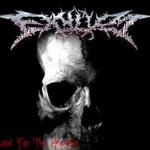 Brutal death metal cliches abound but also tasteful dashes of improvisational riff integration as California youth Exylum strike from the bottomless depths with a manifest of fragmented ideas like old Cannibal Corpse, Finnish death metal and newer black metal in a blender. Weird effected voices cackle, pinch harmonics abound, chugging is all but industrial metal, drumming provides a solid backbone and the ululation of the lead guitar harmonic reaches a hysterical plane of existence when the band lets go of identity expectations and go ballistic as in the end of “Worshiping the Flesh Eating Flies”. The worst thing on this demo is the tendency to fill space with something simple and stupid like the endless low tuned one note rhythmic hammering towards the end of the title track. When the band is in a more chaotic mode, as in the older recording “Ritual Crucifixion”, the confusion serves to imbue the composition with more blood and action.
Brutal death metal cliches abound but also tasteful dashes of improvisational riff integration as California youth Exylum strike from the bottomless depths with a manifest of fragmented ideas like old Cannibal Corpse, Finnish death metal and newer black metal in a blender. Weird effected voices cackle, pinch harmonics abound, chugging is all but industrial metal, drumming provides a solid backbone and the ululation of the lead guitar harmonic reaches a hysterical plane of existence when the band lets go of identity expectations and go ballistic as in the end of “Worshiping the Flesh Eating Flies”. The worst thing on this demo is the tendency to fill space with something simple and stupid like the endless low tuned one note rhythmic hammering towards the end of the title track. When the band is in a more chaotic mode, as in the older recording “Ritual Crucifixion”, the confusion serves to imbue the composition with more blood and action.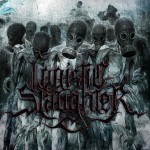 As persistence is the key to cosmic victory, it’s gratifying to see that this recent Californian cluster is not giving up in their quest to build a maiming death metal experience which was approached with streamlined Bolt Thrower and Cannibal Corpse tendencies in their last year’s EP. First threatening edges noted by the listener here are their improved musicianship with plenty of rhythmically aware palm-muting and tremolo NY style rhythm guitar riffs interlocking like the paths of ferocious large insects on flight while in the new drummer Kendric DiStefano they have a redeemer from the abhorrent pit of drum machine grind, even though his style tends to approach the robotic at times. The moments where this EP shines is when the brutal backbone operates at the behest of melody conjured by the leads of Mike Flory and Daniel Austi, such as the gripping mid-section of “Exit Wounds” and the Nile-ish mad arab string conjuration in “Litany of Blood”. I’m still reluctant to call this a total winner because there’s a lot of random chugging around as in generic bands from Six Feet Under to Hypocrisy, but there are also subtle technical flourishes such as the lightly arpeggiated bridge in “War Machine” that still keeps me liking this band and following its movements.
As persistence is the key to cosmic victory, it’s gratifying to see that this recent Californian cluster is not giving up in their quest to build a maiming death metal experience which was approached with streamlined Bolt Thrower and Cannibal Corpse tendencies in their last year’s EP. First threatening edges noted by the listener here are their improved musicianship with plenty of rhythmically aware palm-muting and tremolo NY style rhythm guitar riffs interlocking like the paths of ferocious large insects on flight while in the new drummer Kendric DiStefano they have a redeemer from the abhorrent pit of drum machine grind, even though his style tends to approach the robotic at times. The moments where this EP shines is when the brutal backbone operates at the behest of melody conjured by the leads of Mike Flory and Daniel Austi, such as the gripping mid-section of “Exit Wounds” and the Nile-ish mad arab string conjuration in “Litany of Blood”. I’m still reluctant to call this a total winner because there’s a lot of random chugging around as in generic bands from Six Feet Under to Hypocrisy, but there are also subtle technical flourishes such as the lightly arpeggiated bridge in “War Machine” that still keeps me liking this band and following its movements.
